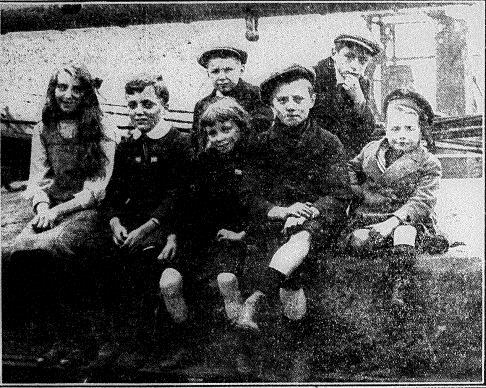Belgian Refugees
13 March 2015
Belgian Refugees in Cardiff, Weekly Mail, 1914.
The BBC News Magazine ran an article in September last year which posed the question of how 250,000 Belgian refugees who came to Britain during the First World War could possibly have left without leaving a trace (http://www.bbc.co.uk/news/magazine-28857769). Not quite without a trace – Agatha Christie’s Hercule Poirot is said to have been inspired by a group of Belgian refugees housed near Torquay.
A large group of refugees settled in South Wales, so we had a look to see if we could find any evidence of them in the records in the Institutional Archive. We discovered that a school founded by the University College of South Wales and Monmouthshire played a role in helping the children of Belgian refugees residing in Cardiff.
The College School, a demonstration school in which members of the Secondary Training Department for Women carried out their teaching practice, taught boys until the age of 10 when they were expected to attend a public school, and girls until they were 18 or 19. In a meeting of the Governing Board held on 21st October 1914, the board resolved that “Miss Fordsham be authorised to admit three or four suitable children of Belgian refugees to the School without payment of fees” [Ref: CS/1].
The minutes of the next meeting, December 1914, report that this resolution had been carried out and that four children of refugees had begun lessons at the School.
Over Christmas, the School extended its involvement when they put on entertainment for the children of Cardiff’s Belgian refugees. By February, concerns were growing that the Belgian pupils were unable to afford books and equipment. In response to these concerns, some members of staff volunteered each to be responsible for one of the Belgian pupils.
By July 1916 the pupils had left the School to be admitted into the specially commissioned Belgian School, but one of the parents, a M. Nägel, expressed his ‘appreciation of the kindness of the Committee in admitting his children to the School’. For the time being, the story of the elusive Belgian refugees continues to be shrouded in mystery. We are hopeful that there is more material to be uncovered within the Institutional Archives, and if anyone has any further insights, we’d be delighted to hear from you.
- Hack your records! 10 simple steps for better records management
- Inspirational People: 3. Kathleen Freeman – Classicist and Fiction Writer
- Dr Mina Moore: marriage and motherhood at Cardiff University in the 1940s
- Inspirational People: 2. Mary “Eppynt” Phillips – The First Female Graduate of the Medical School at Cardiff
- Serendipitous discoveries: a vignette of Percy Bush, early C20th Welsh rugby player